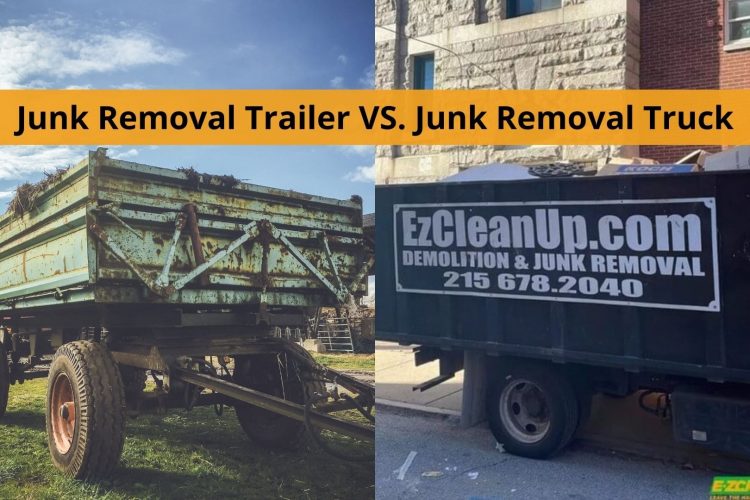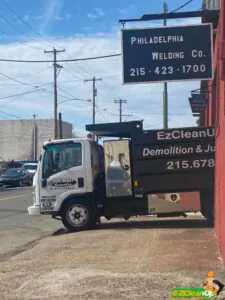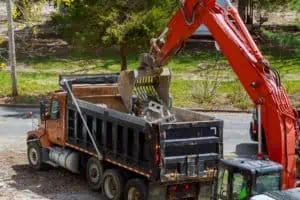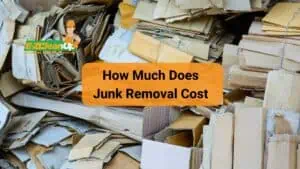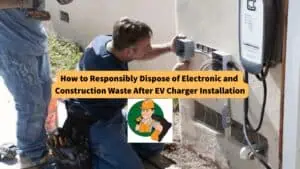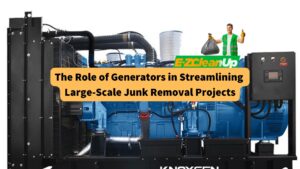A junk removal trailer is a detachable unit towed behind a vehicle, whereas a junk removal truck is an integrated vehicle designed specifically for hauling and dumping waste. Both have their unique advantages depending on the size and nature of the job.
For us at EZ CleanUp Junk Removal Philadelphia, a junk removal truck is the best option, keep on reading to know why and discover more about these two options.

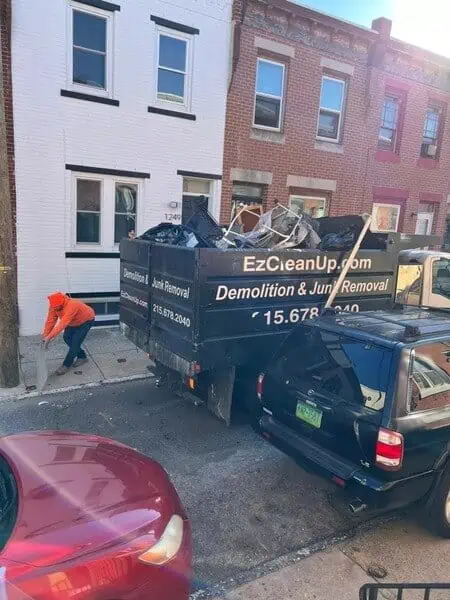
What Is the Difference Between a Dump Truck and a Trailer
A dump truck and a trailer serve similar purposes but have distinct differences.
Design and Structure
A dump truck is a vehicle that has its container attached. It’s specifically designed to transport and dump waste. It has a hydraulic system that allows for the automatic dumping of materials. A trailer is a separate unit that can be attached to and towed by a range of vehicles. Unlike dump trucks, they don’t come with a built-in hydraulic system.
Capacity and Size
Dump trucks come in various sizes, and their capacity often exceeds that of trailers. They’re suitable for big junk removal projects (and that’s why it’s what we use at EZ CleanUp). On the other hand, trailers are versatile and can be used for both small and large tasks. However, their size and capacity might be limited compared to some larger dump trucks.
Flexibility and Usability
Because of its specific design, a dump truck is restricted to its primary function of hauling and dumping. Meanwhile, since it’s detachable, a trailer can serve multiple purposes. Once the junk is removed, the vehicle towing the trailer can be used independently.
Maneuverability
Generally, dump trucks, especially larger ones, might be challenging to maneuver in tight spaces. On the other hand, trailers provide more flexibility in maneuvering, especially if towed by a smaller vehicle.
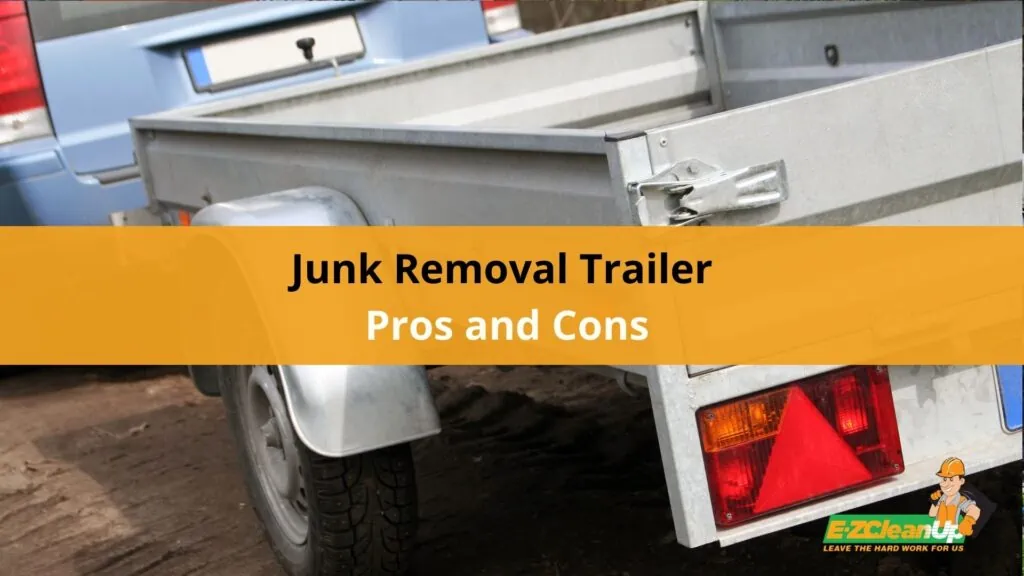
The Junk Removal Trailer: Pros and Cons
When it comes to disposing of unwanted items, whether from your home, construction site, or commercial property, the choice of equipment can make a significant difference. Among the available options, junk removal trailers have carved a niche for themselves, especially for DIY lovers.
Junk Removal Trailer: How It Works
A junk removal trailer is essentially a large, open container on wheels that can be attached to a variety of vehicles for transportation purposes. Unlike fixed containers or trucks, it is a detachable unit that offers flexibility in its usage. Here’s how it typically works:
- Before being loaded, the trailer is attached to a towing vehicle, usually a truck or a large car with a towing capability.
- Junk, debris, or any other waste is then loaded onto the trailer. Some trailers come with side gates or rear doors to make the loading process easier and more organized.
- Once loaded, the trailer, along with the towing vehicle, transports the junk to the desired location, such as a landfill, recycling center, or disposal site.
- At the disposal site, the waste is manually unloaded from the trailer. Some advanced trailers might have a tilting mechanism to assist in unloading, but many require manual labor for this step.
The Limitations and Challenges Associated with Junk Removal Trailers
While junk removal trailers provide a range of benefits, it’s essential to be aware of their limitations and potential challenges:
Limited Capacity
Even though trailers are available in various sizes, they generally have a limited capacity compared to specialized dump trucks. This means for massive junk removal projects, you might require multiple trips, leading to increased costs and time.
Manual Unloading
Most junk removal trailers lack the hydraulic lift system many dump trucks possess. As a result, unloading junk can be labor-intensive, demanding more effort and manpower.
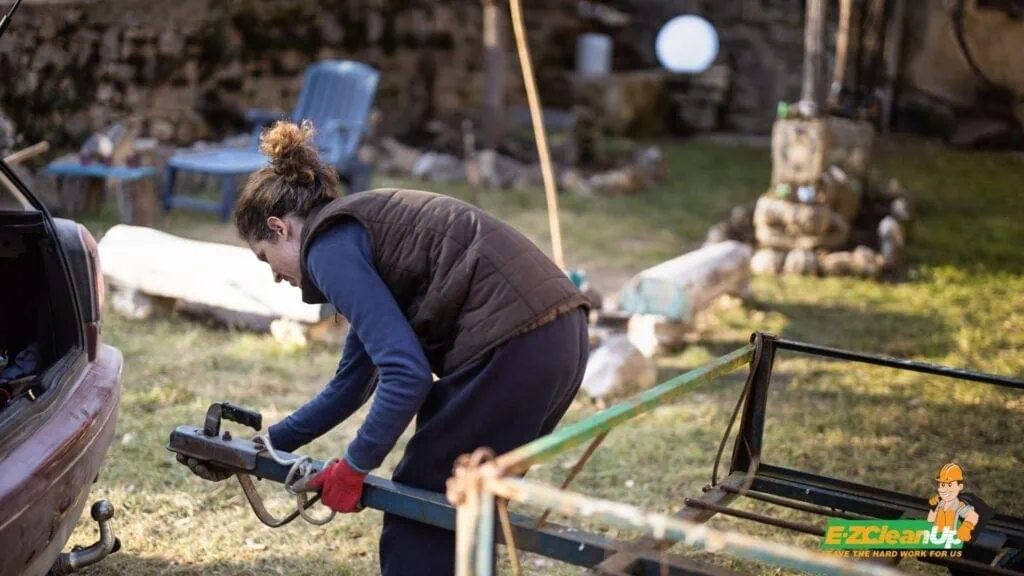
Dependency on a Towing Vehicle
A trailer cannot operate independently; it requires a towing vehicle. If the towing vehicle breaks down or is unavailable, the trailer becomes non-functional.
Maneuvering Challenges
While trailers can be more maneuverable than large dump trucks, when fully loaded, they can pose challenges. Reversing and parking require extra caution and skill, especially in tight spaces.
Wear and Tear
Continuous loading and unloading of heavy junk can result in wear and tear. The flooring of the trailer, in particular, can get damaged over time, which requires regular maintenance and occasional replacements.
Licensing and Regulations
In some regions, using a large trailer for commercial purposes might require special licensing or adherence to specific regulations. This can be a problem for those not familiar with local laws.
Weather Sensitivity
Most junk removal trailers are open, making them susceptible to weather conditions. Rain can make the junk wet, increasing its weight, and wind might blow away lighter items.
Security Concerns
The open design of most trailers can be a security concern, especially if you’re transporting valuable items. There’s a risk of theft or vandalism when leaving a loaded trailer unattended.
The Junk Removal Truck: Pros and Cons
Junk removal trucks are crafted with a singular purpose in mind: to handle waste, both large and small, from household clutter to construction debris. While they bring undeniable advantages to the table, they’re not without their drawbacks.
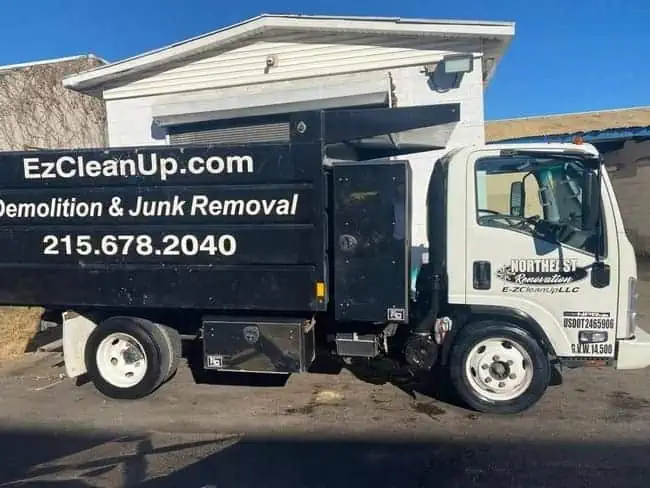
Junk Removal Truck: How It Works
A junk removal truck, often known as a dump truck, is a specialized vehicle designed primarily for transporting and disposing of waste. Unlike trailers, these trucks come with an integrated waste container, eliminating the need for a separate towing vehicle. Here are the standout features of junk removal trucks:
- Integrated Design. The container for holding junk is built into the truck, which offers a seamless waste transport experience.
- Hydraulic Systems. Many junk removal trucks come equipped with hydraulic mechanisms. This feature allows for easy dumping of waste, reduces manual labor, and makes the unloading process faster and more efficient.
- Varying Capacities. These trucks are available in multiple sizes, from smaller models suitable for residential junk removal to larger ones ideal for commercial or construction site cleanups.
- Tailgate Features. Some advanced models feature tailgates with automatic locking systems or even watertight seals to prevent any liquid waste from leaking during transportation.
- Compaction Capabilities. Certain junk removal trucks come with built-in compactors, which allow them to compress waste and increase their carrying capacity.
- Enclosed Containers. Unlike most trailers, many junk removal trucks have enclosed containers. They shield the waste from external elements like rain or wind. This design also enhances security and minimizes the risk of theft or vandalism.
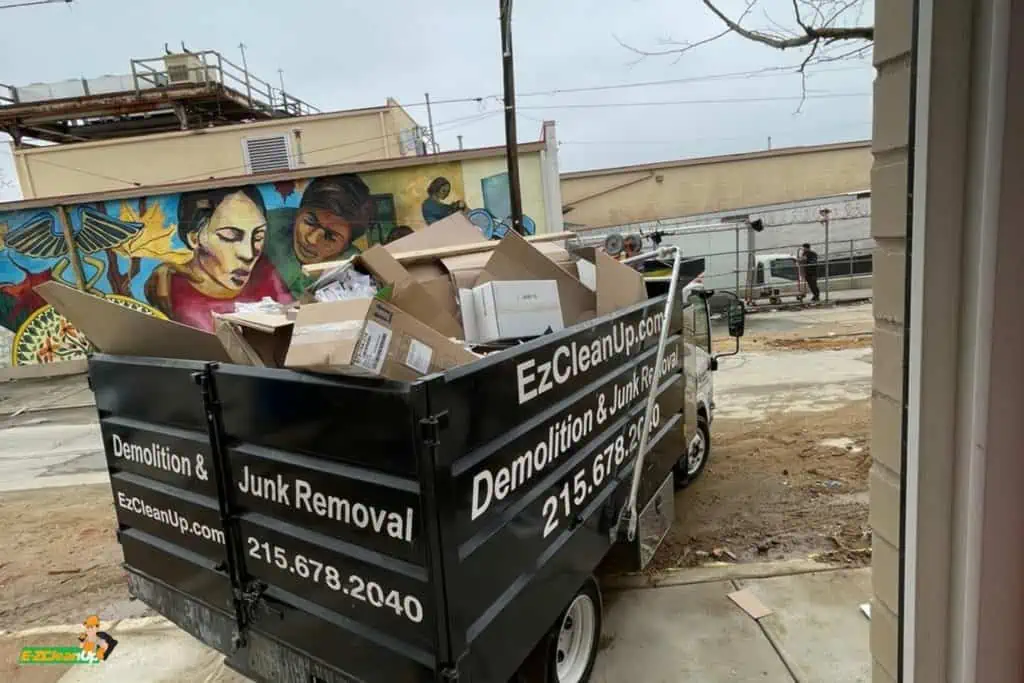
The Benefits of Using a Junk Removal Truck
Junk removal trucks have become a staple in waste management, and for a good reason. These vehicles, built with precision and functionality in mind, provide many benefits that make junk disposal a breeze:
All-in-One Solution
With an integrated design, there’s no need for a separate towing vehicle. This design simplifies the process and reduces the number of equipment and vehicles involved.
Efficient Unloading
The hydraulic systems in many junk removal trucks allow for swift and effortless dumping of waste, which saves both time and labor costs.
Versatility in Size
Whether you’re cleaning out a basement or an entire office building, there’s likely a junk removal truck suitable for the job due to the range of sizes available.
Enhanced Security
Enclosed containers not only protect the waste from external elements but also offer an added layer of security against potential theft or vandalism.
Large Carrying Capacity
Some junk removal trucks, especially those with compactors, can carry a substantial amount of waste in a single trip.
Streamlined Operations
Most junk removal trucks are designed for quick loading and unloading. This reduces the time spent on each job and increases overall efficiency.
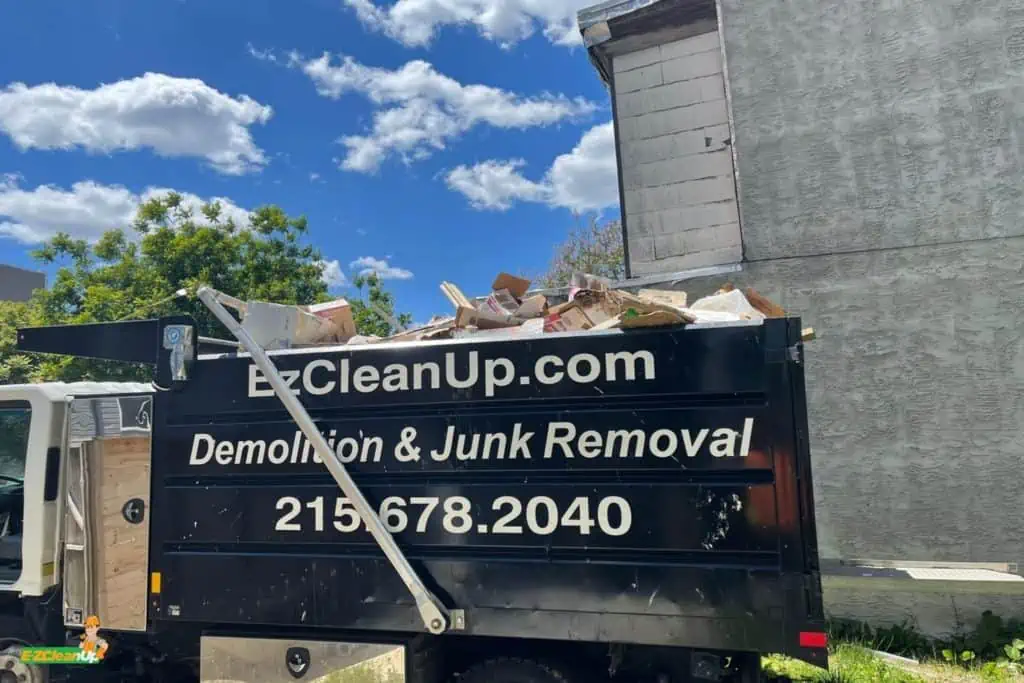
Potential Drawbacks or Limitations of Junk Removal Trucks
Despite their undeniable advantages, junk removal trucks come with a set of challenges that users should be aware of:
- Maneuverability Issues. Larger junk removal trucks can be challenging to drive, especially in tight spaces or residential areas with narrow streets.
- Higher Initial Cost. These specialized vehicles tend to be more expensive than trailers.
- Maintenance Costs. Given their complexity, especially those with hydraulic systems, maintenance can be pricier and more frequent than simpler equipment like trailers.
- Licensing and Training. Operating a junk removal truck often requires specialized licenses and training, which can be a barrier for some individuals or small businesses.
- Limited Flexibility. Unlike trailers, which can be detached and used for other purposes, junk removal trucks are dedicated solely to waste transportation and disposal.
- Fuel Efficiency. Given their size and weight, especially when loaded, these trucks might not be as fuel-efficient as smaller vehicles towing trailers.
Factors to Consider When Choosing
The decision between a junk removal trailer and a junk removal truck isn’t one-size-fits-all. Several variables play a role in determining the best fit for your waste management needs:
1. Volume of Junk
The amount of waste you need to dispose of is perhaps the most obvious factor. For smaller projects or quantities, a trailer might suffice. However, for larger volumes, especially in commercial or construction contexts, a junk removal truck with its greater capacity might be more apt.
2. Accessibility
Consider the location of the junk and its surroundings. If the waste is in a tight space, like a congested city street or a narrow alley, a smaller trailer might be more maneuverable. On the other hand, if there’s ample space, a larger truck could operate without hindrance.
3. Budget
Cost plays a significant role in any decision. Trailers, given their simplicity, are often cheaper both in initial investment and maintenance. However, the efficiency and capacity of a truck might make it more cost-effective in scenarios with big amounts of waste.
4. Duration of the Project
If you’re looking at a long-term project, it’s essential to consider the efficiency of repeated loading and unloading. Trucks with hydraulic systems might save a significant amount of time in the long run.
5. Environmental Considerations
If your waste includes a lot of loose material or could be affected by the weather (like paper or fabrics), the enclosed nature of a truck could be beneficial. It would protect the waste from rain, wind, and other external elements.
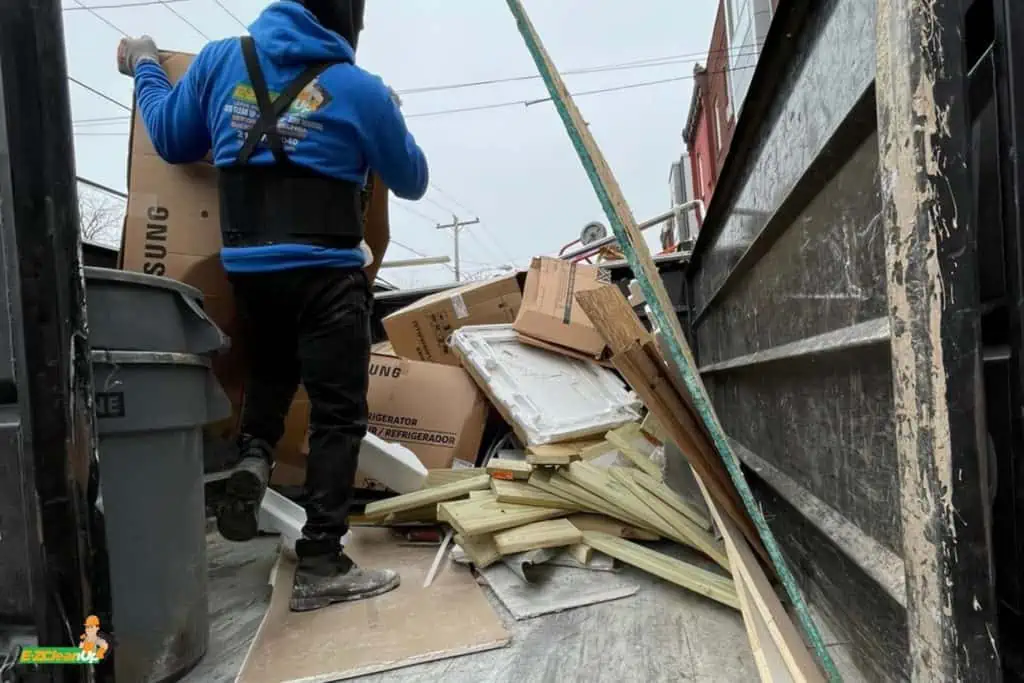
6. Frequency of Use
For those considering purchasing equipment, how often you’ll use it can be a deciding factor. If junk removal is a rare activity for you, investing in a high-end truck might not be justified.
7. Licensing and Training
Operating larger junk removal trucks might require special licenses or training. If you or your team don’t possess these, and there’s a cost or time barrier to acquiring them, it might influence your decision towards a trailer.
Your Next Step to a Clutter-Free Space
Choosing between a junk removal trailer and a junk removal truck involves careful consideration of multiple factors. From the volume of waste and budget constraints to the specific nature of the junk and accessibility concerns, each aspect plays a crucial role in determining the most effective and efficient solution.
If you live around Philly and you need a hand with junk removal, call EZ CleanUp for a seamless, efficient, and affordable solution to all your waste management needs. Your clean and organized space is just a call away! ☎️

